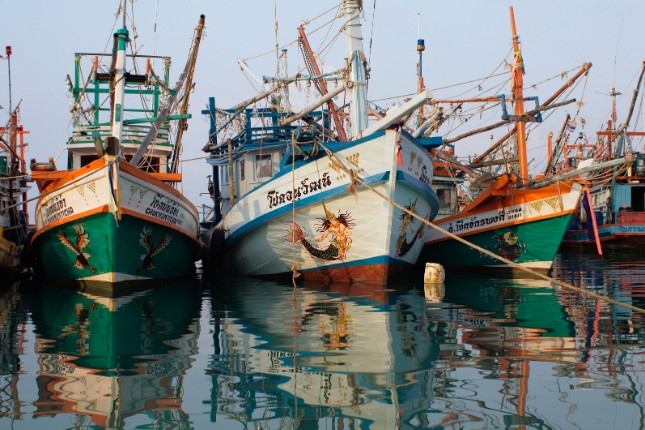-
Ambassador David Balton on Combating Illegal, Unauthorized, and Unregulated Fishing
October 9, 2018 By Truett Sparkman
“The world’s ocean is not in good shape,” said Ambassador David Balton, testifying before the U.S. Senate Subcommittee on Oceans, Atmosphere, Fisheries, and Coast Guard, on September 18. Ambassador Balton is a Senior Fellow with the Wilson Center’s Polar Initiative. As former Deputy Assistant Secretary for Oceans and Fisheries in the Department of State, he coordinated U.S. foreign policy concerning oceans and fisheries, as well as issues relating to the Arctic and Antarctica. According to Balton, the ocean “faces three serious and interrelated challenges: unsustainable fisheries, marine pollution, and serious effects caused by climate change and related challenges such as ocean acidification.”
The hearing focused on addressing illegal, unreported, and unregulated (IUU) fishing globally. Over the years, we have made encouraging progress combatting IUU fishing, both nationally and internationally, Balton said, citing the UN’s Sustainable Development Goal 14, the Port State Measures Agreement (PSMA), treaties with Russia and the European Union, as well as domestic policies to prevent IUU fishing. But despite progress, more needs to be done, he said.
To better combat IUU fishing, the ambassador made several recommendations. Among them, he suggested that the US promote “widespread adherence to, and implementation of, the Port State Measures Agreement,” to give developing countries the resources they need to implement it properly. In addition, Balton suggested expanding fish traceability programs. “In an ideal world, a consumer buying a fish in a restaurant or in a market would know where that fish was caught, who caught it, whether it was caught legally, and whether it…is the fish it claims to be,” he said.
Balton also recommended convincing other states to end subsidies that contribute to overfishing and IUU fishing. Commitments have been made many times on paper, Balton noted. “Now,” he said, “we must insist that these commitments be fulfilled.” Ambassador Balton’s full list of recommendations can be found in his written testimony.
IUU fishing raises concerns beyond those related to overharvesting a limited natural resource. “IUU fishing and human trafficking have common drivers,” said Dr. Bama Athreya, Labor and Employee Rights Specialist with USAID. Citing a study conducted in Southeast Asia by the International Justice Mission, she said that up to 80 percent of migrant workers in Southeast Asia who were interviewed experienced trafficking at some point while working as crew on fishing vessels. The study reports that approximately 38 percent of fishermen interviewed were clearly trafficked. USAID suggests that we “address the environmental and human rights challenges together” in order to make a bigger difference in the fight against both the environmental degradation and human rights violations associated with IUU fishing.
True success, Balton said, “will lie in working with other nations, particularly developing states that lack the capacity to fight IUU fishing effectively.” But much work still must be done. Roughly one-third of marine fish stocks are currently harvested at unsustainable rates. If this fraction continues to grow, he said, “serious consequences for food security and the marine environment will follow.”
Ambassador Balton’s written testimony
Dr. Athreya’s written testimony
Read more:
- How coders can help small communities combat big fishing fleets
- What impact does IUU fishing have on the Somali coast and it fishing communities?
- What makes fish a geostrategic resource like oil and water?
Sources: International Justice Mission, International Labor Organization, UN Food and Agriculture Organization, UN Sustainable Development, U.S. National Oceanic and Atmospheric Administration, U.S. Department of State, U.S. Senate
Photo Credit: The fishing fleet at Sri Thanu beach, Ko Pha Ngan, Thailand, 2007, courtesy of Colin and Sarah Northway.
 A Publication of the Stimson Center.
A Publication of the Stimson Center.



